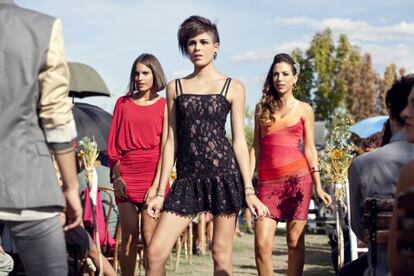Goyas opt to laugh in the face of crisis
‘La gran familia española’ heads list of nominations dominated by comedy

Spain has had an economic crisis to cry about for too long. And, of course, so too has its film industry. Perhaps for the sake of putting on a brave face, Spanish filmmakers have this year opted for laughter — never mind the crisis, meager box office returns or attacks from the Finance Ministry. That, at least, is what can be taken from the votes of Spanish Film Academy members, who this week turned comedy into the star of the nominations for the 2014 Goya Awards. The 28th edition of the prizes will be held on February 9 and presented by comedian Manel Fuentes.
There are doubts, however, surrounding the big favorite, La gran familia española (or, The great Spanish family), which leads the running with 11 nominations. It has been labeled a comedy but its director, Daniel Sánchez Arévalo, doesn’t completely agree. “My theory is that it isn’t,” he noted during one of the press conferences held after the announcement of the nominations at the Film Academy in Madrid. “It’s about an imperfect family and the acceptance of death. It’s more like a mix of genres, which is what I like.”
What is, without doubt, a comedy is director Javier Ruzi Caldera’s Three Many Weddings, which received seven nominations but was left out of the main categories: Best Director and Best Film.
More or less the same thing happened with Witching and Bitching and its creator Alex de la Iglesia, one of those unlikely to have been smiling too much after Tuesday’s announcement. His film exits second from the starting blocks with 10 nominations, but is not in the running for the two most coveted prizes.
Alex de la Iglesia’s latest got 10 nods, but not for the most coveted prizes
But while it was a veteran who got a bad surprise, it was a debutant who received unexpected delight. Wounded, the first feature directed by editor Fernando Franco, will compete for the statuette for Best Film and in five other categories. Among these, Franco himself is hoping to be crowned Best New Director, and his star, Marián Álvarez, Best Actress. She seems the candidate best placed to triumph: the award normally ends up in the hands of the winner of the Silver Shell at the San Sebastián Festival, which she received last September.
Antonio de la Torre is hoping to take home at least one prize this year. As in 2012, the actor has again received a double nomination: in the Best Actor category for Cannibal — Manuel Martín Cuenca’s film obtained eight nominations — and for Best Supporting Actor for La gran familia española. Last year he went home empty-handed — who knows this time round?
Also competing in two categories are Carlos Bardem (for Best Supporting Actor and Best Adapted Screenplay for Alacrán enamorado) and Emilio Aragón (for Best Score and Best Song for A Night in Old Mexico).
At one point, Tatiana Hernández was even competing twice in the same category: Best Costume Design. But this is now banned by the rules and thus, as has become the norm in recent years, the Academy removed her nomination for La gran familia española. Her replacement is Lala Huete, which increases Living Is Easy with Eyes Closed’s haul to seven nominations, including Best Film and Best Director for David Trueba. Completing the list of the films competing as the year’s best are director Gracia Querejeta’s 15 Years and One Day, and Cannibal. Meanwhile, Azul y no tan rosa, El médico alemán, Gloria and The Golden Cage are all up for Best Foreign Film in the Spanish Language.
As he did in 2012, Antonio de la Torre has received a double nomination
There, though, the smiles end. Because as well as taking care of the jokes and the spectacle, Spanish cinema’s big night will also have to tackle the dramatic situation at the Spanish box office. Last year’s gala, which dragged along with it the fallout from 2012’s huge 13-percentage-point hike in the VAT rate on movie tickets, became the occasion for political outbursts from some prizewinners.
Twelve months later and the VAT rate remains at 21 percent, while the Spanish box office last year took in 507 million euros, 107 million less than in 2012 — an even worse context. In fact, not one of this year’s favorites took in more than five million euros. And there’s not much comedy in that.
Tu suscripción se está usando en otro dispositivo
¿Quieres añadir otro usuario a tu suscripción?
Si continúas leyendo en este dispositivo, no se podrá leer en el otro.
FlechaTu suscripción se está usando en otro dispositivo y solo puedes acceder a EL PAÍS desde un dispositivo a la vez.
Si quieres compartir tu cuenta, cambia tu suscripción a la modalidad Premium, así podrás añadir otro usuario. Cada uno accederá con su propia cuenta de email, lo que os permitirá personalizar vuestra experiencia en EL PAÍS.
¿Tienes una suscripción de empresa? Accede aquí para contratar más cuentas.
En el caso de no saber quién está usando tu cuenta, te recomendamos cambiar tu contraseña aquí.
Si decides continuar compartiendo tu cuenta, este mensaje se mostrará en tu dispositivo y en el de la otra persona que está usando tu cuenta de forma indefinida, afectando a tu experiencia de lectura. Puedes consultar aquí los términos y condiciones de la suscripción digital.









































